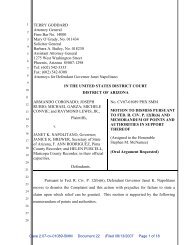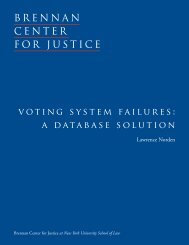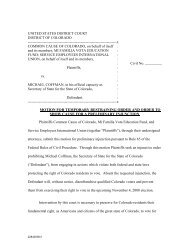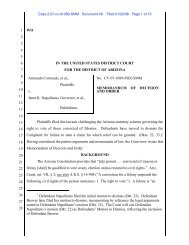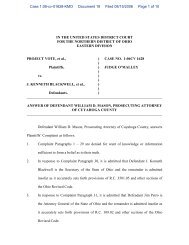immigrants & pleas in problem-solving courts - Brennan Center for ...
immigrants & pleas in problem-solving courts - Brennan Center for ...
immigrants & pleas in problem-solving courts - Brennan Center for ...
You also want an ePaper? Increase the reach of your titles
YUMPU automatically turns print PDFs into web optimized ePapers that Google loves.
drug treatment order. The Department of Homeland Security <strong>in</strong>itiates removal proceed<strong>in</strong>gs<br />
aga<strong>in</strong>st her, say<strong>in</strong>g she can be deported because of her conviction.<br />
Example 2: John is a noncitizen and does not have legal status. He has been married to a<br />
United States citizen <strong>for</strong> five years. John has been charged with Aggravated Harassment, 2 nd<br />
degree, a Class A misdemeanor. He pleads down to Harassment <strong>in</strong> the 2 nd degree (Penal Law<br />
240.26), a violation. It is his second such conviction. He is sentenced to a conditional<br />
discharge and a batterer program. He completes the program successfully and receives a<br />
discharge. A few months later, his wife sponsors his adjustment of status application so that<br />
he can receive lawful permanent resident status (a green card). He is placed <strong>in</strong> removal<br />
proceed<strong>in</strong>gs, and told that he might be deported on the basis of his status and his convictions.<br />
What options <strong>in</strong> <strong>problem</strong>-solv<strong>in</strong>g court will give me the best chance of rejo<strong>in</strong><strong>in</strong>g my family<br />
and community <strong>in</strong> the U.S. rather than be<strong>in</strong>g deported<br />
Some <strong>problem</strong>-solv<strong>in</strong>g <strong>courts</strong> and prosecutors may be will<strong>in</strong>g to consider certa<strong>in</strong> alternative<br />
arrangements <strong>for</strong> noncitizen defendants who want to preserve their opportunity to rejo<strong>in</strong> their<br />
families and communities. These alternatives help fulfill the objectives of <strong>problem</strong>-solv<strong>in</strong>g<br />
<strong>courts</strong> because they permit the defendant to seek rehabilitation and return to his or her family as<br />
a law-abid<strong>in</strong>g caretaker and wage earner.<br />
You can ask your crim<strong>in</strong>al defense attorney and/or reentry advocate to approach the court with<br />
the follow<strong>in</strong>g alternatives:<br />
1. Ask to enter the program without plead<strong>in</strong>g guilty<br />
Some <strong>courts</strong> will permit defendants to participate <strong>in</strong> court-ordered treatment without plead<strong>in</strong>g<br />
guilty to the <strong>in</strong>itial crim<strong>in</strong>al charges (<strong>for</strong> example, through an Adjournment <strong>in</strong> Contemplation<br />
of a Dismissal (ACD)). Your crim<strong>in</strong>al defense attorney should ask the court to consider that<br />
option <strong>in</strong> your case. If the court seems unwill<strong>in</strong>g to drop the plea requirement, your attorney<br />
can offer someth<strong>in</strong>g else <strong>in</strong>stead of a guilty plea or on-the-record admission. For example,<br />
with the assistance of your attorney, you could sign a contract with the prosecutor <strong>in</strong> which<br />
you agree to give up certa<strong>in</strong> trial rights <strong>in</strong> exchange <strong>for</strong> enter<strong>in</strong>g the court-ordered program<br />
without any admission of guilt.<br />
For examples of the k<strong>in</strong>ds of alternative arrangements that have been successfully used <strong>in</strong><br />
<strong>problem</strong>-solv<strong>in</strong>g <strong>courts</strong>, contact the Immigrant Defense Project at (212) 725-6422.<br />
2. Ask to plead to a different charge<br />
Some <strong>courts</strong> will not be will<strong>in</strong>g to consider lett<strong>in</strong>g you participate <strong>in</strong> the treatment program<br />
without some k<strong>in</strong>d of guilty plea. In that case, you should talk to your crim<strong>in</strong>al defense<br />
attorney about whether another plea might be appropriate given the facts of your case. For<br />
example, while a plea to a drug offense will almost certa<strong>in</strong>ly make you subject to possible<br />
deportation, a plea to another charge <strong>in</strong> your case might leave you <strong>in</strong> a better position to face<br />
4




![Download the Letter [PDF] - Brennan Center for Justice](https://img.yumpu.com/50139248/1/190x245/download-the-letter-pdf-brennan-center-for-justice.jpg?quality=85)


